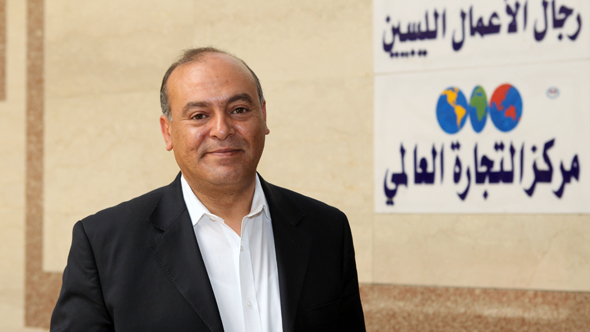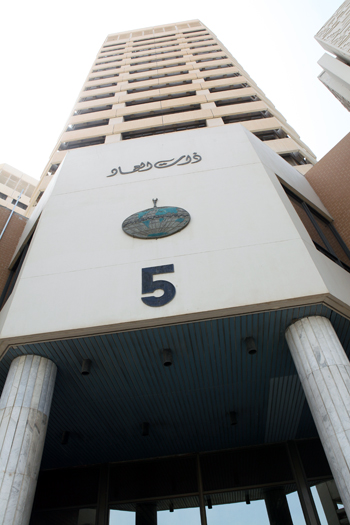Libya: Doing Business is Getting Easier
Abdulnaser Ben Nafaa, Chairman of Libyan Businessmen Council
We should start by talking about the Libyan Businessmen Council which consists of 470 members from all sectors and specialized fields, including health care, education, construction, oil services, aviation and naval sector. This council was established back in 2004, yet it was only activated recently in 2013.
Interview with Abdulnaser Ben Nafaa, Chairman of Libyan Businessmen Council

There is not a lot of information about the private sector in Libya, can you give us an overview of the private sector here? How many people are working in the private sector? What is the representation of the GDP, how many companies are active? What are the main industries?
The Libyan business community under the previous regime was rent-based old fashioned economy that was controlled by the regime, for that reason we had a very bad economy because the private sector wasn’t taken care of despite its importance and the job opportunities it has been offering for Libyans. During the last two years we have been witnessing a change.
We should start by talking about the Libyan Businessmen Council which consists of 470 members from all sectors and specialized fields, including health care, education, construction, oil services, aviation and naval sector. This council was established back in 2004, yet it was only activated recently in 2013.
The Businessmen council is considered to be a part of the civil community structure which defends the rights of the businessmen in Libya against other parties including the government. We have about 25 common councils with other nations. We are also members in other organizations like the Arab Businessmen Union, the European Union, the World Trade Centre and many other such international organizations or bodies all over the world. One of our goals is to encourage foreign investors to invest in Libya in partnership with the real Libyan businessmen.
Libya used to be a socialist state, which means no private sector ownership was allowed under the Gaddafi’s regime, now this has changed. Do you see the Libyan society drifting towards socialism or do you see more of the private sector activities within the society?
The Libyan business community under the previous regime was rent-based old fashioned economy that was controlled by the regime, for that reason we had a very bad economy because the private sector wasn’t taken care of despite its importance and the job opportunities it has been offering for Libyans. During the last two years we have been witnessing a change. New important laws have been issued which benefit both the Libyan businessmen and the foreign investors. Libya is open for everyone, and especially to foreign investors who bring in new technologies and liquidity.
As for services companies which are involved in construction and other similar sectors, then it’s good to know that they act under the resolution number 207 which was issued by the Ministry of Economy in 2012. Knowing that the mentioned resolution is a very good one, and it benefits both Libyans and the foreigners when it comes to partnerships.
What are the major challenges to doing business in Libya? According to the IMF, there are a lot challenges, Libya ranks very badly in terms of doing business when it comes to corruption, rule of law, political stability and accountability in law enforcements. So in your opinion, how difficult is it to do business in Libya?
It is not difficult to do business here anymore as reforms and development are finally feasible and noticeable. We know that it is important for the private sector not to have corruption in the state, because the corruption is what damages the business. So as Libyan businessmen, we are the first who stand in the face of corruption. And personally, when I used to be a member in the transactional national assembly, I was focusing on how to eradicate corruption.
A commission was established with me being its leader in order to form a committee with the purpose of fighting corruption and spread awareness about the dangers of it. The committee is already active with its mission. As for me, I was a forming member of this committee and now I have returned to my previous status as a businessman, but the purpose of being a member in the transactional national assembly was to fight corruption, and by the Will of Allah I can consider this as a personal achievement.
Now after two years we know the challenges that still face us, like the corruption we spoke about. But I can say that the situation nowadays is far better than before, we are being heard, we are getting answers. So by the Help of Allah we are heading towards the right path, we just need some time. Now the important thing to do now is activate the right laws, which already exist, maybe the activation is still slow but we are moving forward.
Hydrocarbons or oil have dominated the Libyan economy since a long time now, as the oil forms 70% of the Libyan GDP, more than 95% of exports and approximately 90% of government revenues, so we can say that makes Libya an oil economy. What are the prospects for diversification in your opinion? What is going on the ground? Does the government have any tendency to diversify the economy?
We start first by talking about the economy and how it is structured around oil. We spoke earlier about the rent-based old fashioned economy where the state is responsible for all the citizens, thinking that they didn’t need businessmen or a private sector based economy because all the dictators in the world fight whoever has money. So that defamed the reputation of the Libyan businessmen. On the other hand, the European Union plays a big role in hindering development and the way our economy is affected. For example the European Union prevented Libya from joining several agreements because of the old regime, like the GAT agreement and others. Also let me tell you another thing, we have a long coastline that stretches for more than 2,000 km, and it is abused by our neighbours through theft, when we should be the only ones to benefit from it. So when we try to fish and export our product, we will be told that we are forbidden from exporting our fish, and the exports should go through Egypt or Tunisia.
So in this way the European Union is responsible for hindering the proper development of the Libyan economy. We are talking here about huge fish resources since we have a very long coastline, and the fish we have is not only about quantity but also the quality of it is great since the Mediterranean fish is considered the best in the world. Yet we are forbidden from exporting it so we need to go through Tunisia or Egypt. And as a Libyan fish company I rather sell my products in Libya than selling it in Egypt or Tunisia. This is how the European Union is pressuring us, they know we have oil yet they only allow us to export through the neighbouring countries. If we deal with this, it might push our economy by 10% and in the future it can go up to 20% through fishing and tourism, yet all of that will fall into its place in the right time by Allah’s Will since the state is doing what it should for us.
This is how the European Union is pressuring us, they know we have oil yet they only allow us to export through the neighbouring countries. If we deal with this, it might push our economy by 10% and in the future it can go up to 20% through fishing and tourism, yet all of that will fall into its place in the right time by Allah’s Will since the state is doing what it should for us.
For example, I met our Minister of Foreign Affairs when he was conducting several meetings with the foreign ministers of countries from the EU, and we made it clear that our top priority is to open the door for Libyan exports because of the oppression that fell upon us. Also, the world labelled us as a country that has an oil-only-based economy, for example the GAT agreement we mentioned earlier states that the share of Libya from tuna production is only 900 tons, when we look at the tiny island of Malta we see that the share is 2,000 tons and for Tunisia it’s 1,700 tons, yet when we try to discuss this matter they tell us that every country as its own share! But the fact is that our share is eaten by Malta, Tunisia and Egypt through what they call “law”!
We all must work together on this matter; the development and stability of Libya is a part of the development and stability of the European Union, there is no difference in opinions there. Libya is facing Europe, it is not a distant country.
This is why we need help from everyone, so that we can leave that stereotype idea that states that our economy is only based on oil. Sure we can’t get rid of this reputation instantly since we are a developing country with no private sector, but by Allah’s Will we will get there as we continue to demand for our rights, increase our shares and reduce our reliance on oil.
Now regarding laws, are you fully satisfied with the commercial law, with how its crafted? And what would you as the private sector welcome, what amendments should the government consider towards the commercial code?
The ministries would consult with the Libyan Businessmen Council before issuing a new resolution, since we have joint commissions with most of the ministries. We discuss with them the intended resolutions to be changed after they present them to us, so we give our opinion which is taken in consideration by the way. I think that we will have fair economical resolutions with the new Libyan constitution that benefits local and foreign parties.
Lastly, what would be your message to the international community about Libya? It’s true that there is not much positive information and that there is a lot of negativity out there regarding the security situation, so what is your own take on the ground? And what do you always say when you meet your international partners?
We advise the international community to help Libya, because the stability in Libya means the stability of the region as a whole, and especially the neighbouring countries. We hope that the international companies, who had businesses in Libya but they haven’t resumed their work yet, will do so very soon. Their return means job opportunities for many Libyans who work in foreign companies instead of holding arms in the streets, so when the company reopens he will return to his job. As for the previous agreements which Libya wasn’t allowed to be a part of, we hope we can do so now. Also, we as the Libyan Businessmen Council welcome the foreign investors, whether they have partners or no, and we advise them to offer positive help. We welcome any investor who comes with good ideas and new technologies and we will do everything possible to help him without asking for anything in return.